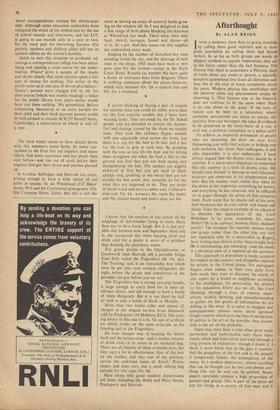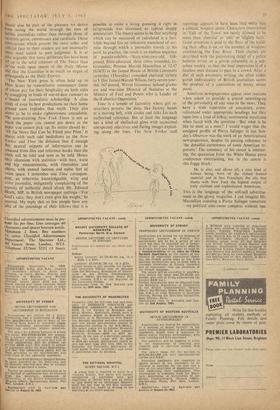Afterthought
By ALAN BRIEN
T NOTE a tendency these days to praise novelists 1 by calling them good reporters and to deni-
grate journalists by calling them bad fiction writers. In so far as both groups use words as slippery symbols to capsule impressions, they are in the fancy rather than the fact business. The illusion that there is somewhere a Platonic ideal of truth about any event or person, a scientific blueprint guaranteed free from all distortion and bias, lies at the root of many complaints about, the press. Modern physics has established that the observer alters any phenomenon simply bY observing it. That famous tree in the limerick does not continue to be the same when 'there is no one about in the quad.' If the laws of nature can be bent in a laboratory where elaborate precautions are taken to ensure ob- jectivity, how can we expect the rules of evidence to be preserved in the hurly-burly of a riot, a civil war, a political conspiracy or a police raid?
To achieve an impartial assessment of people who are slamming the door on your foot, threatening you with libel actions or bribing you with exclusive lies about their colleagues, is not only impossible, it is also undesirable. I havO always argued that the drama critic should be a reporter. It is much more important to remembeA that the reporter is a kind of drama critic. H9 should train himself to become as well-informed, accurate and observant as his temperament per mits. But his readers must realise that when he sits down at .his typewriter everything he knows, and everything he has observed, will be reflected on to paper through the prism of that tempera,-,.. ment. Each word that he plucks out of his cere- bral thesaurus has its own colour and sound and shape. Take the simplest example of an adjective to describe the appearance of, say, Lord Hailsham. Is he stout, corpulent, fat, obese; fleshy? Or is he stalwart, brawny, burly, thickset( portly? The moment the reporter chooses from one group rather than the other (the two list4 are separated only by a semi-colon in Roget), he is writing near-fiction rather than straight fact.; He is commenting, not recording—and the result is a personal view of a segment of the universe.
This approach to journalism is rarely accepted by readers in this country and altogether rejected by writers in the United States. Yet newspaper buyers must realise, in their own daily lives, how much they trust or discount the worth of any report by a friend or neighbour according to his intelligence, his personality, his politics or his reputation. Every day we sift, like Lord Denning, through a mass of rumour, super- stition, wishful thinking and misunderstanding to gather the few grains of information we are willing to file away. It is naive to imagine that newspapermen possess some secret personal Geiger-counter which sorts the false from the true. If politics is the art of the possible, then journa- lism is the art of the probable.
There may have been a time when print made permanent and authoritative only those state- ments which had been tested and tried through a long process of evaluation—though I doubt it. I think it more likely that in the past it mummi- fied the prejudices of the few and in the present it temporarily freezes the assumptions of the many. In a modern democracy, almost anything that can be thought can be said and almost any- thing that can be said can be printed. News- papers inevitably contain a high proportion of guesses and gossip. This is part of the price we pay for living in a society of free men and it
should also be part of the pleasure we derive from seeing the world through the eyes of fallible journalists rather than through those of infallible gurus, commissars and cardinals. Those Publications -which present the most sober and flidicial face to their readers are not necessarily IhOse most suited to pass judgment. It is at least arguable that more deliberate lies have been Killtp in the solid columns of The Times than 16'1the wide open spaces of the Doily Mirror "1d that the Guardian is as much an organ of Pi4aganda as the Daily Express. .11'he New York press is often held up to Pket Street by transatlantic commuters (most or whom pay for their hospitality on both sides by smuggling in' loads of out-of-date rumour) as a'''model of 'journalistic scholarship. A close study of even its' best productions on their home ground soon explodes that myth. Their aim sCrns to be to- make righteousness unreadable. 'We arm-straining New York Times is not so flinch the paper yOu cannot' put down as the Paper you Cannot pick up. Its motto should be: 'All the News that Can be Fitted into Print.' It Shares with such odd 'bedfellow's as the New Yorker and Time the delusion that if enough flat; neutral snippets of information can be alnassed from .files and reference books then the trtith will be told and seen to be told. Hence their obsession with statistics---with bust, waist aild hip measurements, with timetables and charts, with annual income, and cubic feet of rObm space. I remember one Time correspon- dent, an otherwise knowledgeable, witty and aCnte journalist, indignantly 'complaining of the scarcity of authentic detail about Mr. Edward .1-teath, MP, in British newspaper cuttings-120r Gbd's sake, they don't even give his weight,' he sneered. My reply that so few people have any idea of the poundage of their fellows that it is possible 'to make a living guessing it right in fairgrounds was dismissed as typical sloppy amateurism. The theory seems to be that anything which can be measured or calculated is a fact, while beyand lies an unknown wasteland of sur- mise through which a journalist travels .at his peril. In practice. the result is an endless sequence of pseudoexhibitsHSixty-nine-year-old," 168- pound, Eton-educated, three times wounded, ex- Grenadier, Premier Harold Macmillan at 12.47 (GMT) in the famed House of British Commons yesterday (Thursday) conceded electoral victory to J. (for James) Harold Wilson, forty-seven-year- old, I67-pound, Wirral Grammar School gradu- ate and war-time Director of Statistics at the Ministry of Fuel and Power who is Leader of the (Laborite) Opposition.'
Time is a temple of factuality where girl re- searchers process the data, like factory hands at ,a, .moving belt, .with circles and ticks for each authorised reference. But at least the language has a kind of shellacked gloss with occasional unexpected adjectives and flaring images explod- ing along the lines. The New Yorker stall reportage appears to have been bled white into a clinical, hospital prose. Characters interviewed in 'Talk of the Town' are rarely allowed to be more than 'cheerful' or 'able' or 'slightly built.' Great attention is paid to the floor of the build- ing their office is on, or the number Of windows overlooking the East River. Their clothes are described with the painstaking detail qf a police bulletin writer or a gossip columnist in a sub- urban weekly, so that the final impression is of a faceless man dressed to pass in a crowd. After a diet of such automatic writing, the often rather garish individuality of British journalism seems the product of it convention of boozy minor poets.
American newspapermen appear most insecure when asked to provide a potted summing-up of the personality of any man in the news. They have a wide repertoire of anecdOtes, cross- referenced under appropriate headings, but they lapse into a kind of folksy, sentimental mysticism when faced with the question-'But what is he like to meet as a man?' I would wager that the unsigned profile of Pierre Salinger in last Sun- day's Observer was the work of an Americanised newspaperman, despite its passing reference to 'the dreadful earnestness of some American re- porters.' The summary of his career is interest- ing, the quotation frOm the White House press conference entertaining, but in the centre is this foggy blurb:
He is also, and above all, a rare kind of human being, born of the richest human material and in San Francisco, the city that
0. shares with New York the highest output of truly civilised and sophisticated Americans.
7.; This is the language of the soft-sell advertise-
• ment in the glossy magazine. I can imagine Mr. Macmillan ordering a Pierre Salinger tomorrow --no, political ante-room complete without one.







































 Previous page
Previous page